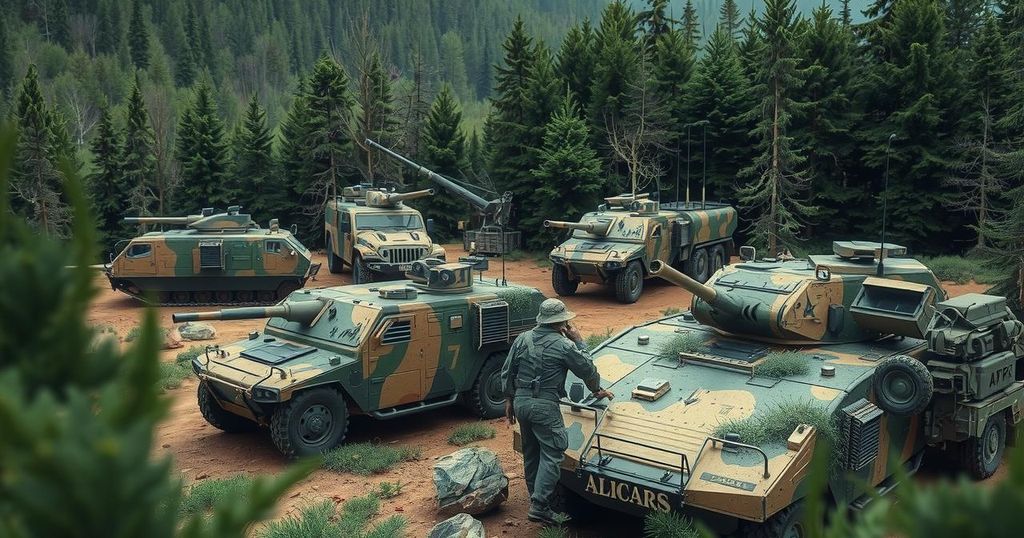World news
ASIA, BLACK SEA, CNN, DIPLOMACY, ENERGY INFRASTRUCTURE, EUROPE, EUROPE/ASIA, FRANCE, JOINT CHIEFS OF STAFF, KIM, KIM JONG UN, KOREA, NORTH, KOREA, SOUTH, KR, KREMLIN, MILITARY, MILITARY COOPERATION, MOSCOW, NORTH, NORTH AMERICA, NORTH KOREA, PARIS, PUTIN, PYONGYANG, RUSSIA, RUSSIA-NORTH KOREA COOPERATION, SAUDI ARABIA, SEOUL, SERGEI SHOIGU, SOUTH KOREA, TA, TASS, UKRAINE, UNITED STATES, US, VLADIMIR PUTIN, WAR, WHITE HOUSE
Fatima Alavi
0 Comments
North Korea Bolsters Support for Russia in Ukraine Conflict with Additional Troops
North Korea has sent 3,000 additional troops to assist Russia in Ukraine, adding to the 11,000 already deployed. The support includes military equipment and signals deepening ties between the two nations. Concurrently, discussions surrounding peace negotiations are ongoing, with ongoing violence raising humanitarian concerns.
According to South Korea’s military, North Korea has dispatched an additional 3,000 soldiers to Russia at the beginning of this year, emphasizing its unwavering support for Moscow’s ongoing conflict in Ukraine. This follows earlier reports of approximately 11,000 troops sent to assist Russia, with around 4,000 personnel reportedly casualties in combat operations, as disclosed by South Korea’s Joint Chiefs of Staff.
North Korea has also contributed significant military resources, including a substantial number of short-range ballistic missiles and artillery units such as 170-millimeter self-propelled howitzers and 240-millimeter multiple rocket launchers. South Korea anticipates that these contributions may escalate based on the evolving situation in the region.
The announcement of North Korea’s military support coincides with a meeting of European leaders in Paris focused on strengthening aid for Ukraine and achieving long-term regional stability. This is set against the backdrop of the United States’ efforts, which recently pointed to a tentative agreement on halting hostilities in the Black Sea between Russia and Ukraine, although Russia’s stringent conditions reveal disparities in negotiation expectations.
Russian President Vladimir Putin and North Korean leader Kim Jong Un have been enhancing their military cooperation since formalizing a defense agreement last year that emphasizes mutual assistance. Recently, Putin’s top security adviser, Sergei Shoigu, visited Pyongyang to convey greetings from the Russian president and reiterated the importance of their military collaboration.
There are warnings from US officials about the potential for Russia to share advanced military technologies with North Korea, including satellite capabilities, in return for Pyongyang’s ongoing support in the conflict. Since late last year, North Korean troops have reportedly been stationed in the Russian region of Kursk, although they withdrew from active engagements after suffering heavy casualties.
Reports indicate that the toll on North Korean forces has been severe, with estimates suggesting around 400 soldiers killed and approximately 3,600 wounded by late February. Tactics used by these soldiers have raised alarm, featuring extreme measures to avoid capture, as previously noted.
In addition to this military support, North Korea has provided vast amounts of military supplies to Russia, furthering their alliance. North Korean medical facilities have treated numerous Russian soldiers wounded in Ukraine, highlighting ongoing cooperation between the two nations.
As the war progresses, the relationship continues to expand with North Korea developing new military technologies. Kim recently oversaw tests of advanced AI-powered drones, indicating a focus on modern warfare capabilities. There are also indications that North Korea has potentially adapted technology sourced from Russia for these new drones, according to South Korean military statements.
As conflicts persist, including a recent surge in drone attacks by Russian forces on Ukrainian cities, leaders like Ukrainian President Volodymyr Zelensky have decried the ongoing violence, emphasizing the urgent need for peace in the region. Amid these developments, discussions regarding ceasefires remain tenuous, with the war escalating despite diplomatic efforts.
In summary, North Korea’s recent dispatch of additional soldiers to Russia signifies a deepening military alliance amid ongoing efforts for peace in Ukraine. The propensity for North Korea to supply military resources and potential technology transfer further complicates the geopolitical landscape. Concurrently, the conflict demonstrates the severe humanitarian impacts faced by the nations involved, underscoring the need for concerted diplomatic initiatives for achieving lasting stability.
Original Source: www.cnn.com




Post Comment